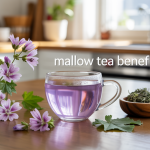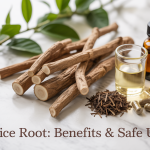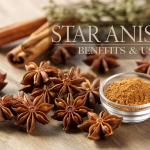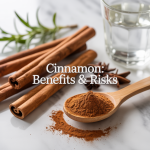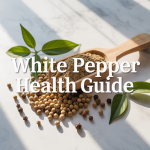Thyme tea has quietly become one of the most versatile herbal remedies in kitchens and medicine cabinets worldwide. This fragrant brew offers impressive health benefits backed by centuries of traditional use and modern research.
This guide is perfect for health-conscious individuals, herbal tea enthusiasts, and anyone curious about natural wellness alternatives. We’ll explore the science-backed health benefits of thyme tea, including its antimicrobial and respiratory support properties. You’ll also learn about potential side effects and safety considerations to ensure you can enjoy this herbal remedy responsibly.
Ready to start brewing? We’ll walk you through a step-by-step preparation guide that guarantees the perfect cup every time, plus share creative ways to make thyme tea part of your daily routine.
What Makes Thyme Tea a Powerful Herbal Remedy
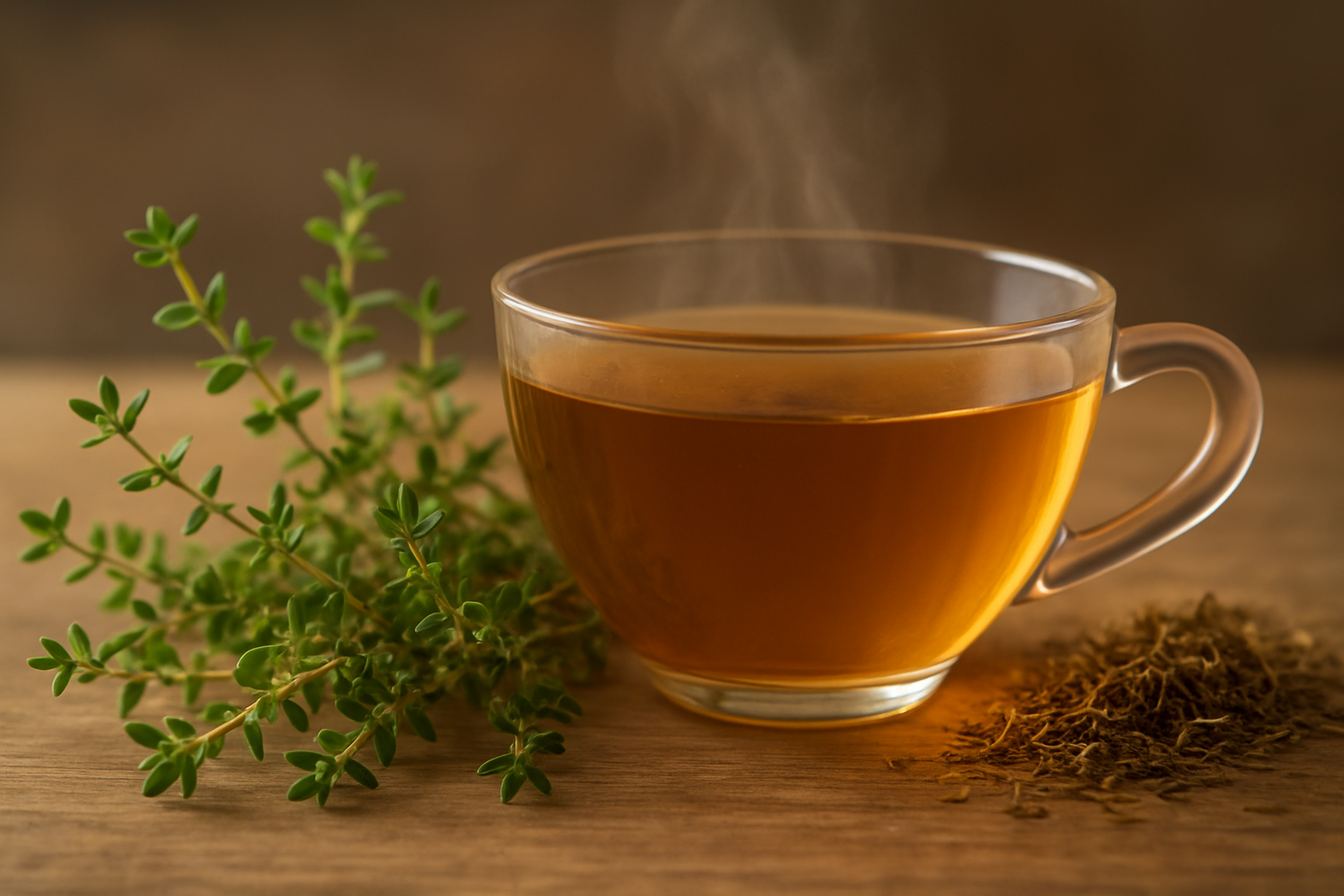
Active compounds and essential oils in thyme
Thyme packs a serious punch when it comes to bioactive compounds. The star player here is thymol, a phenolic compound that gives thyme its signature antimicrobial and antiseptic properties. This powerful compound makes up about 20-54% of thyme’s essential oil content and works like nature’s own antibiotic.
Carvacrol is another heavy hitter in thyme’s arsenal. Working alongside thymol, this compound delivers potent antioxidant and anti-inflammatory effects. Together, these two compounds create a formidable defense system against harmful bacteria, viruses, and fungi.
The essential oil profile doesn’t stop there. Thyme contains p-cymene, which enhances the absorption of other beneficial compounds, and linalool, known for its calming properties. Borneol adds respiratory benefits, while terpinene contributes additional antimicrobial effects.
Flavonoids like apigenin, luteolin, and thymonin round out thyme’s chemical makeup. These compounds act as powerful antioxidants, protecting cells from damage caused by free radicals. The combination creates a synergistic effect where each compound amplifies the benefits of others.
Historical uses in traditional medicine
Ancient civilizations recognized thyme’s healing power long before modern science explained why it works so well. The Egyptians used thyme in their embalming processes, capitalizing on its preservative and antimicrobial properties. They also brewed thyme tea to treat respiratory ailments and digestive issues.
Greek physicians like Hippocrates prescribed thyme for respiratory conditions, including coughs, bronchitis, and chest congestion. The Greeks believed thyme gave courage and strength, often burning it as incense in temples and adding it to baths before battle.
Roman soldiers carried thyme into battle, using it to treat wounds and prevent infections. They recognized its ability to boost immune function and maintain health during long campaigns. Roman women also used thyme tea to ease childbirth and support recovery.
Medieval monasteries cultivated thyme extensively, with monks documenting its use for treating everything from nightmares to epilepsy. They created detailed records of thyme preparations for digestive problems, respiratory infections, and skin conditions.
Traditional European herbalists passed down knowledge of thyme’s benefits through generations. They used it to treat whooping cough, asthma, and bronchial infections. Folk medicine also employed thyme tea for menstrual irregularities, urinary tract infections, and general weakness.
Nutritional profile and key vitamins
Thyme tea delivers impressive nutritional value despite being a low-calorie beverage. A single cup provides meaningful amounts of vitamin C, supporting immune function and collagen synthesis. This vitamin content helps explain why thyme tea has been traditionally used to fight off colds and infections.
Vitamin A content in thyme supports healthy vision, immune function, and cellular communication. The herb also provides vitamin K, which plays a crucial role in blood clotting and bone health. These fat-soluble vitamins work together to maintain multiple body systems.
The mineral profile is equally impressive. Iron content supports oxygen transport throughout the body, while manganese aids in bone formation and wound healing. Calcium and magnesium contribute to bone health and muscle function.
| Nutrient | Amount per cup | Key Benefits |
|---|---|---|
| Vitamin C | 15-20mg | Immune support, antioxidant |
| Vitamin A | 180-220 IU | Vision, immune function |
| Iron | 1.2-1.8mg | Oxygen transport |
| Manganese | 0.4-0.6mg | Bone health, metabolism |
Thyme contains trace amounts of folate, riboflavin, and niacin, supporting energy metabolism and nervous system function. The combination of vitamins and minerals creates a nutritional profile that complements thyme’s active compounds, making the tea both therapeutic and nourishing.
Science-Backed Health Benefits of Thyme Tea
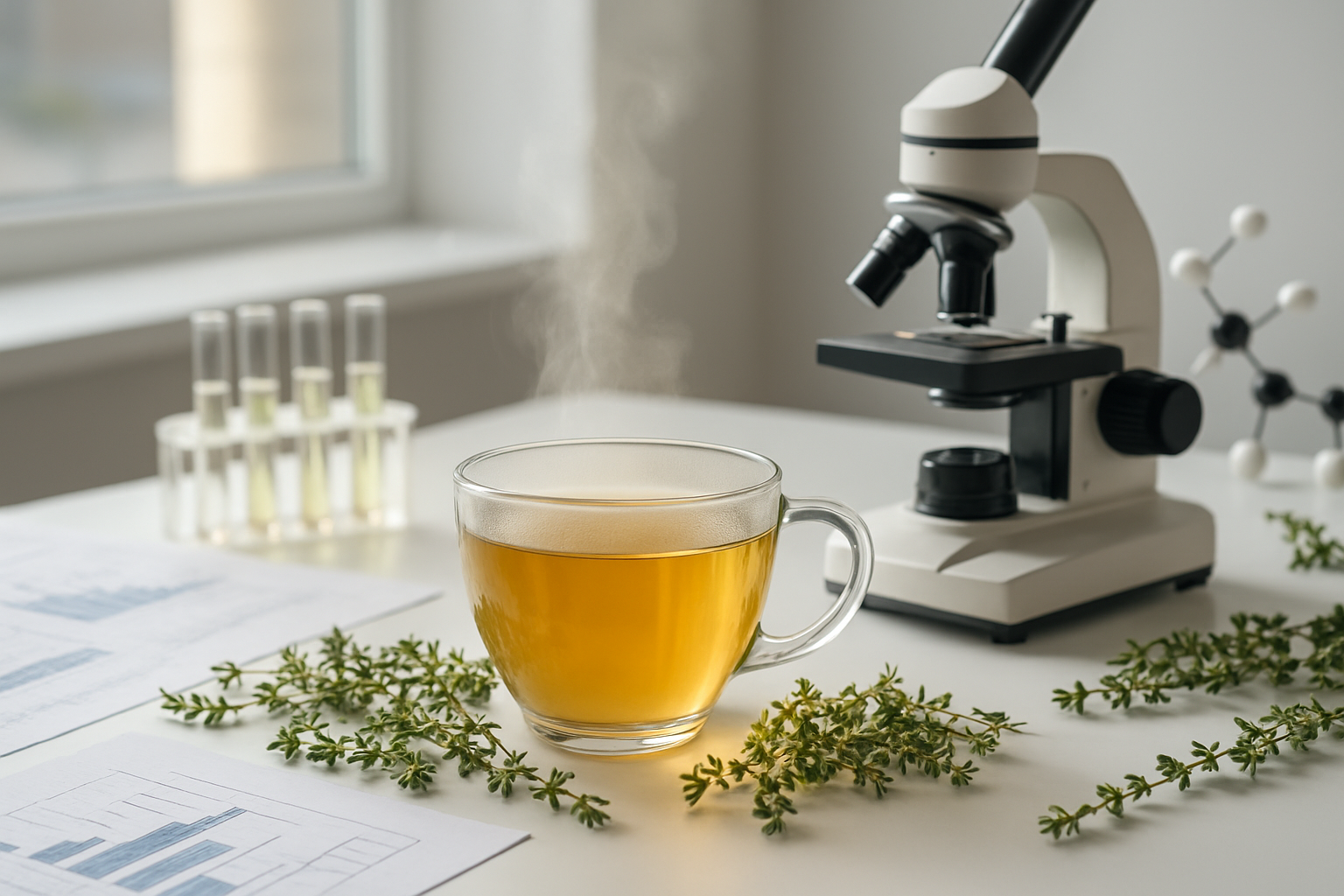
Respiratory support and cough relief
Thyme tea stands out as a natural remedy for respiratory ailments, backed by centuries of traditional use and modern scientific research. The herb contains powerful compounds like thymol and carvacrol that work as natural expectorants, helping to loosen mucus and clear congested airways. When you’re dealing with a persistent cough or bronchitis, thyme tea can provide gentle yet effective relief.
Clinical studies have shown that thyme extract significantly reduces coughing frequency and intensity compared to placebo treatments. The antimicrobial properties of thyme also help combat respiratory infections by targeting harmful bacteria and viruses that often trigger coughing spells. Many people find that drinking warm thyme tea before bedtime helps quiet nighttime coughs, leading to better sleep quality during illness recovery.
The anti-spasmodic effects of thyme compounds help relax the smooth muscles in your respiratory tract, making breathing easier when you’re congested. This makes thyme tea particularly valuable for people with asthma or chronic obstructive pulmonary disease (COPD), though it should complement rather than replace prescribed medications.
Digestive system improvements
Your digestive system receives remarkable support from regular thyme tea consumption. The herb’s carminative properties help reduce gas, bloating, and stomach discomfort after meals. Thyme stimulates the production of digestive enzymes, which break down food more efficiently and reduce the likelihood of indigestion.
Research indicates that thyme’s antimicrobial compounds can help maintain a healthy balance of gut bacteria by inhibiting harmful microorganisms while supporting beneficial ones. This balanced microbiome contributes to better nutrient absorption and overall digestive health. People who struggle with irritable bowel syndrome (IBS) often report symptom improvement when incorporating thyme tea into their daily routine.
The herb also demonstrates gastroprotective effects, helping to protect the stomach lining from damage caused by excessive acid production or harmful bacteria like H. pylori. Thyme’s anti-inflammatory properties reduce intestinal inflammation, which can alleviate symptoms of inflammatory bowel conditions.
Immune system strengthening properties
Thyme tea acts as a natural immune system booster through multiple mechanisms. The herb contains high concentrations of vitamin C, along with flavonoids and phenolic compounds that enhance your body’s defense mechanisms. These antioxidants help protect immune cells from oxidative damage, keeping them functioning optimally.
The antimicrobial properties of thyme compounds provide direct protection against pathogens. Studies show that thyme extract can inhibit the growth of various bacteria, fungi, and viruses that commonly cause infections. Regular consumption may help reduce the frequency and severity of common colds and other respiratory infections.
Thyme also supports the production and activity of white blood cells, which are your body’s primary defense against invading pathogens. The herb’s immunomodulatory effects help regulate immune responses, preventing both underactive and overactive immune reactions that can lead to chronic illness or autoimmune conditions.
Anti-inflammatory and antioxidant effects
The anti-inflammatory power of thyme tea comes from its rich concentration of bioactive compounds that help reduce inflammation throughout your body. Chronic inflammation contributes to numerous health problems, including heart disease, arthritis, and certain cancers. Thyme’s natural anti-inflammatory agents work at the cellular level to interrupt inflammatory pathways.
Thyme ranks among the herbs with the highest antioxidant capacity, containing compounds that neutralize harmful free radicals before they can damage cells and tissues. These antioxidants help slow the aging process and reduce the risk of chronic diseases associated with oxidative stress. The ORAC (Oxygen Radical Absorbance Capacity) value of thyme is exceptionally high, making it a potent weapon against cellular damage.
Regular consumption of thyme tea may help reduce markers of inflammation in the blood, such as C-reactive protein and interleukin-6. This systemic anti-inflammatory effect can translate to reduced joint pain, better cardiovascular health, and improved cognitive function over time.
Potential Side Effects and Safety Considerations
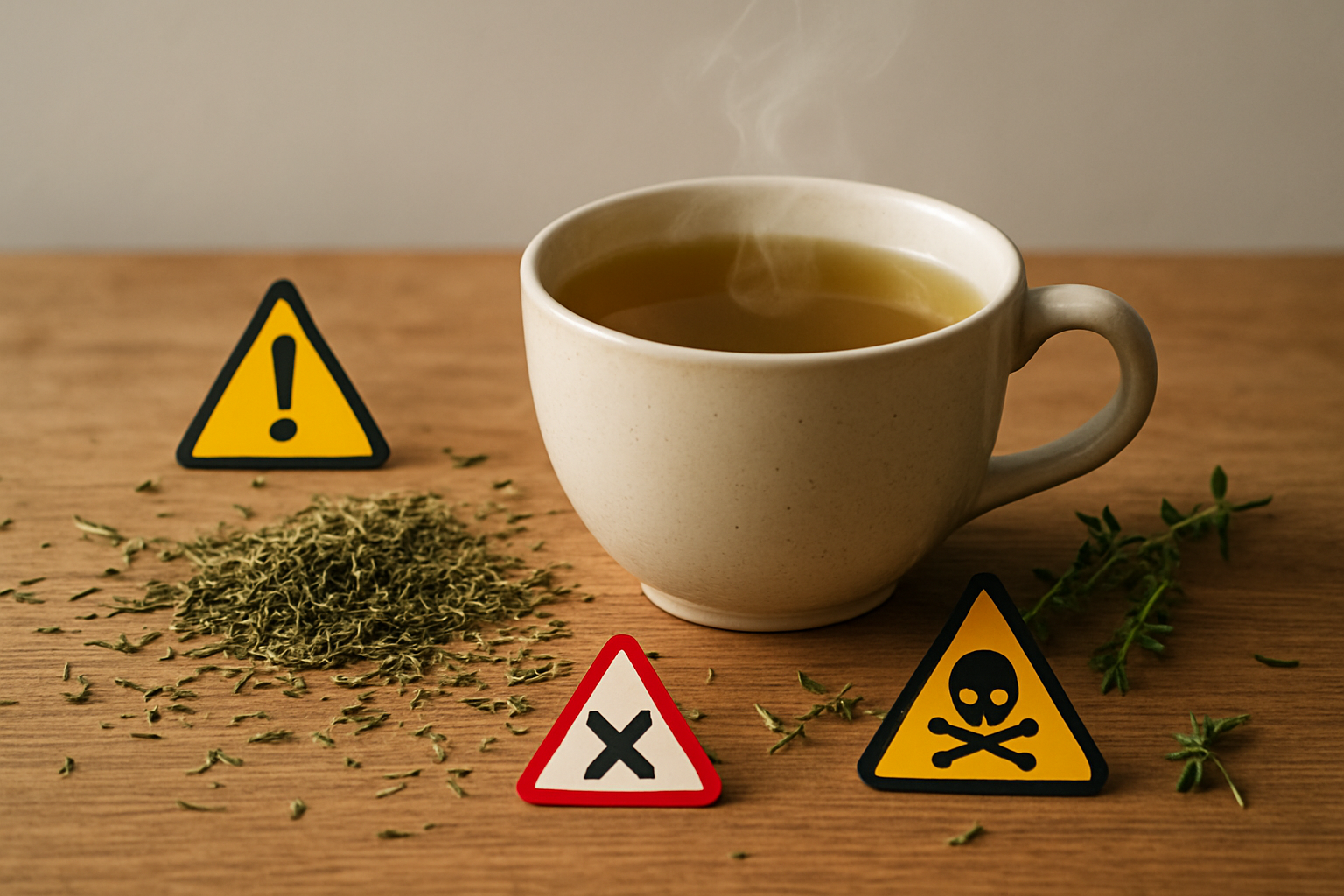
Common adverse reactions and allergies
Thyme tea typically sits well with most people, but like any herbal remedy, it can trigger reactions in sensitive individuals. The most common side effects include mild stomach upset, nausea, or digestive discomfort, especially when consumed on an empty stomach or in large quantities.
Allergic reactions to thyme are relatively rare but can occur. People with known allergies to plants in the mint family (including oregano, basil, sage, or lavender) should approach thyme tea with caution. Signs of an allergic reaction include skin rashes, itching, swelling around the face or throat, difficulty breathing, or hives. Anyone experiencing these symptoms should stop consuming thyme tea immediately and seek medical attention.
Some people may also experience headaches or dizziness after drinking concentrated thyme tea. These effects often result from consuming too much too quickly or brewing the tea too strong.
Drug interactions and contraindications
Thyme contains compounds that can interact with certain medications, making it important to check with healthcare providers before adding thyme tea to your routine if you take prescription drugs.
Blood-thinning medications like warfarin, aspirin, or clopidogrel may have enhanced effects when combined with thyme. The herb contains natural compounds that can increase bleeding risk, potentially leading to excessive bruising or prolonged bleeding from minor cuts.
Thyme may also interact with thyroid medications. The herb can affect thyroid function, potentially interfering with medications like levothyroxine or methimazole. People with thyroid conditions should monitor their symptoms closely and work with their doctors to adjust medication dosages if needed.
Diabetes medications present another area of concern. Thyme can lower blood sugar levels, which might amplify the effects of insulin or oral diabetes medications, potentially causing dangerously low blood sugar.
Recommended dosage limits
Moderation proves key when drinking thyme tea. Most herbalists recommend limiting intake to 1-2 cups per day for healthy adults. Each cup should use about 1 teaspoon of dried thyme or 1-2 teaspoons of fresh thyme leaves.
Drinking more than 3 cups daily may lead to digestive issues or other unwanted effects. The concentration also matters – stronger brews increase the likelihood of side effects, so start with milder preparations and gradually adjust to your preference.
People new to thyme tea should begin with just half a cup daily to gauge their body’s response before increasing intake.
Special precautions for pregnant and nursing women
Pregnant women should exercise particular caution with thyme tea. While culinary amounts of thyme in cooking are generally safe, the concentrated amounts found in medicinal teas could potentially stimulate the uterus and increase the risk of miscarriage, especially during early pregnancy.
The essential oils in thyme that provide its therapeutic benefits may cross the placental barrier and affect fetal development. Most healthcare providers recommend avoiding medicinal amounts of thyme during pregnancy, particularly in the first trimester.
Nursing mothers face similar concerns. Thyme compounds can pass through breast milk to infants, and babies’ developing systems may not process these substances as effectively as adult systems. The concentrated nature of thyme tea makes it more potent than the small amounts typically used in cooking.
Women who are pregnant or breastfeeding should consult their healthcare providers before consuming thyme tea. In many cases, doctors may recommend waiting until after pregnancy and nursing to incorporate herbal teas into wellness routines, or they may suggest very limited, occasional use under medical supervision.
Step-by-Step Guide to Brewing Perfect Thyme Tea
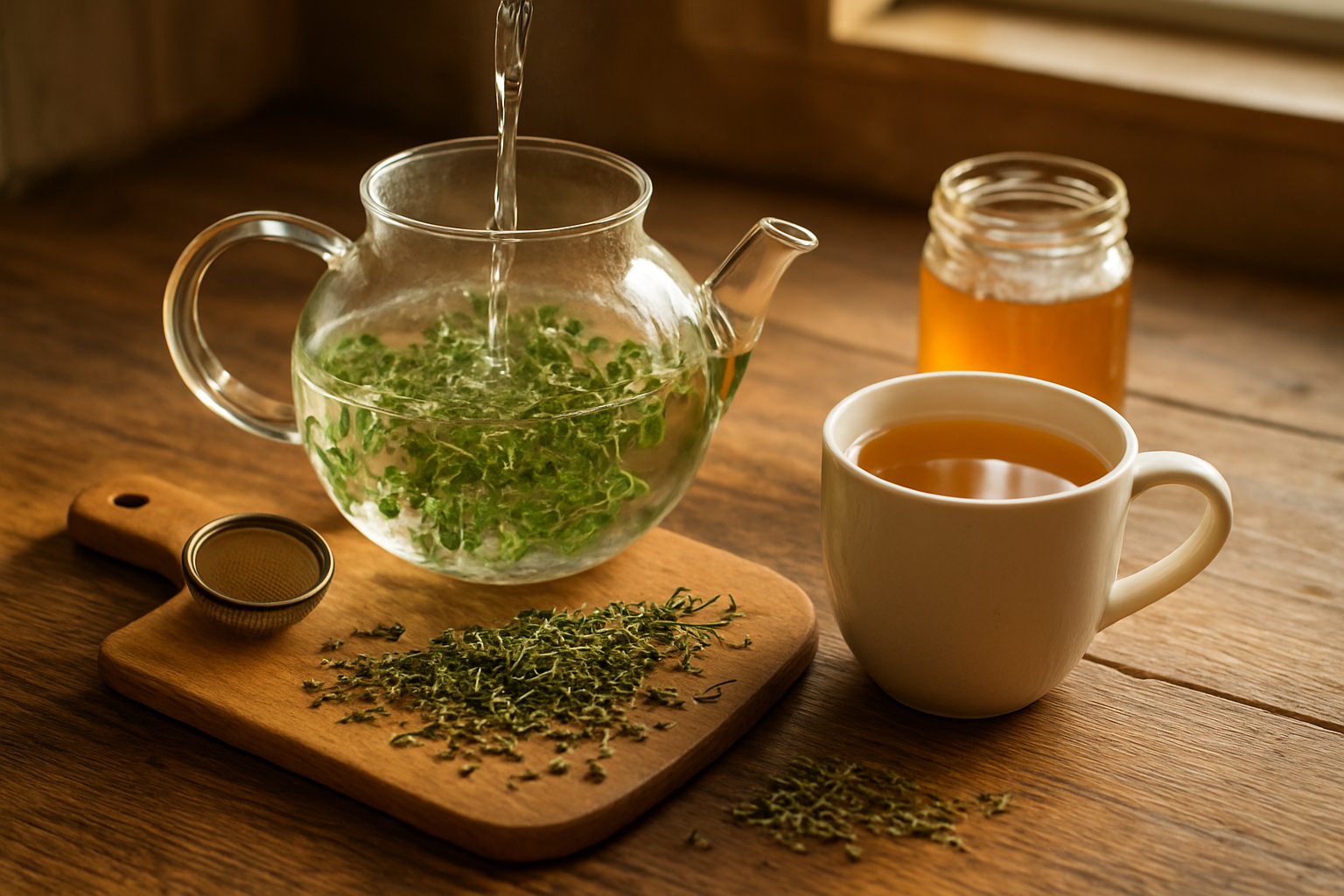
Selecting Fresh Versus Dried Thyme
Both fresh and dried thyme create delicious, aromatic tea, but each brings unique qualities to your cup. Fresh thyme delivers a brighter, more vibrant flavor with subtle citrusy notes and a gentle herbal intensity. The leaves contain higher moisture content, which releases essential oils more gradually during steeping. You’ll need about 2-3 sprigs of fresh thyme per cup of water.
Dried thyme offers convenience and concentrated flavor. The dehydration process intensifies the herb’s earthy, slightly minty characteristics. Since dried herbs are more potent, you’ll only need 1 teaspoon per cup. Store-bought dried thyme works well, but home-dried thyme from your garden provides superior flavor retention.
Fresh thyme works best when you want a lighter, more delicate tea, while dried thyme creates a robust, warming brew perfect for evening relaxation or when battling cold symptoms.
Proper Steeping Techniques and Timing
Water temperature plays a crucial role in extracting thyme’s beneficial compounds without creating bitterness. Heat water to 200°F (93°C) – just below boiling. If you don’t have a thermometer, bring water to a rolling boil, then let it cool for 2-3 minutes.
For fresh thyme, steep for 5-7 minutes. Gently bruise the leaves with the back of a spoon before adding hot water to release more oils. Cover your cup or teapot during steeping to prevent volatile compounds from escaping.
Dried thyme requires 3-5 minutes of steeping time. Longer steeping doesn’t necessarily mean stronger benefits – it often just adds unwanted bitterness. Strain the tea through a fine mesh strainer or remove tea bags promptly when steeping time ends.
| Thyme Type | Steeping Time | Water Temperature |
|---|---|---|
| Fresh | 5-7 minutes | 200°F (93°C) |
| Dried | 3-5 minutes | 200°F (93°C) |
Flavor Enhancement with Natural Additions
Raw honey pairs beautifully with thyme tea, complementing its herbal notes while adding natural antibacterial properties. Stir honey into warm (not hot) tea to preserve its beneficial enzymes. Manuka honey offers extra therapeutic benefits.
Lemon transforms thyme tea into a zesty, refreshing drink. Add fresh lemon juice just before drinking, or steep a few lemon slices alongside the thyme. The citrus enhances vitamin C content and creates a bright, uplifting flavor profile.
Ginger root adds warming spice and digestive benefits. Slice fresh ginger thinly and steep it with thyme for 2-3 additional minutes. This combination works particularly well for soothing sore throats or settling upset stomachs.
Fresh mint creates a cooling contrast to thyme’s earthiness. Add 2-3 mint leaves during the final minute of steeping. Cinnamon stick, orange peel, or a few cardamom pods also make excellent additions, each bringing their own health benefits and flavor complexity to your thyme tea experience.
Creative Ways to Incorporate Thyme Tea into Your Daily Routine
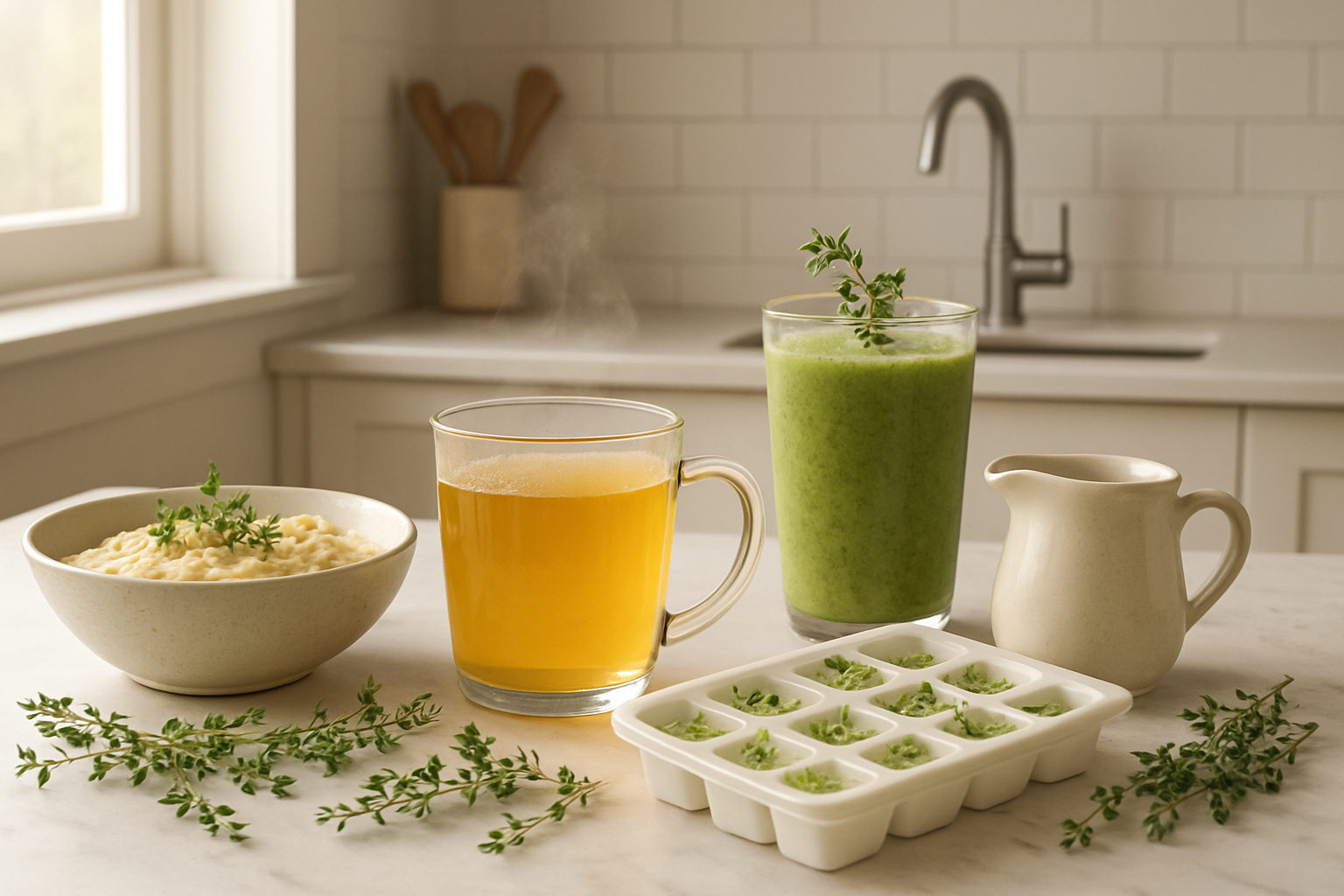
Best times of day for maximum benefits
Timing your thyme tea consumption can significantly enhance its therapeutic effects. Morning consumption on an empty stomach helps kickstart your digestive system and provides antimicrobial protection throughout the day. The tea’s natural energizing properties make it an excellent coffee alternative without the jitters.
Mid-afternoon serves as another optimal window, especially when you’re feeling sluggish or fighting off seasonal bugs. The antioxidants help combat afternoon energy dips while supporting your immune system during peak stress hours.
Evening consumption works wonderfully for respiratory support, particularly if you’re dealing with congestion or cough. Sip thyme tea 30-60 minutes before bedtime to allow its expectorant properties to work while you sleep. However, avoid drinking large quantities right before bed, as thyme can be mildly stimulating for some people.
During illness, drink thyme tea every 2-3 hours throughout the day for maximum antimicrobial benefits. The consistent intake helps maintain therapeutic compounds in your system.
Combining thyme tea with other herbs
Pairing thyme with complementary herbs creates powerful synergistic blends that target specific health concerns more effectively than single herbs alone.
Respiratory Support Blends:
- Thyme + Eucalyptus + Peppermint: Creates a potent decongestant blend
- Thyme + Sage + Licorice root: Soothes throat irritation and dry coughs
- Thyme + Ginger + Lemon balm: Combats cold symptoms while calming inflammation
Digestive Health Combinations:
- Thyme + Fennel + Chamomile: Reduces bloating and digestive discomfort
- Thyme + Peppermint + Ginger: Stimulates digestion and reduces nausea
Immune-Boosting Blends:
- Thyme + Echinacea + Elder flower: Strengthens immune response
- Thyme + Astragalus + Rose hips: Provides vitamin C and adaptogenic support
Stress Relief Mixtures:
- Thyme + Lavender + Lemon balm: Promotes relaxation while maintaining mental clarity
- Thyme + Passionflower + Chamomile: Reduces anxiety without drowsiness
Start with equal parts of each herb, then adjust ratios based on taste preferences and desired effects.
Storage tips for maintaining potency
Proper storage preserves thyme’s volatile oils and therapeutic compounds, ensuring maximum potency over time.
Fresh Thyme Storage:
Store fresh thyme sprigs in the refrigerator wrapped in slightly damp paper towels inside a plastic bag. This method maintains freshness for up to two weeks. For longer storage, freeze fresh thyme in ice cube trays with a little water.
Dried Thyme Storage:
Keep dried thyme in airtight glass containers away from light, heat, and moisture. Dark pantry shelves or herb cabinets work perfectly. Properly stored dried thyme retains potency for 2-3 years, though aromacy peaks within the first year.
Pre-made Tea Blend Storage:
Store custom thyme tea blends in small glass jars with tight-fitting lids. Label each blend with ingredients and creation date. Keep away from spice racks near stoves, as heat degrades essential oils rapidly.
Quality Indicators:
Fresh thyme should have vibrant green color and strong aroma. Dried thyme loses potency when it becomes dusty, faded, or loses its characteristic scent. Replace old herbs rather than using larger quantities of weakened material.
Consider vacuum-sealing larger quantities of dried thyme for long-term storage, which can extend shelf life up to five years when stored in cool, dark conditions.
Making thyme tea blends for specific health goals
Crafting targeted thyme tea blends allows you to address specific health concerns while enjoying varied flavors and enhanced therapeutic benefits.
| Health Goal | Thyme Blend Recipe | Preparation Method |
|---|---|---|
| Cold & Flu Relief | 2 tsp thyme + 1 tsp ginger + 1 tsp elderberry + honey | Steep 10 minutes, strain, add honey |
| Digestive Support | 1 tsp thyme + 1 tsp fennel + 1 tsp chamomile | Steep 5-7 minutes after meals |
| Respiratory Health | 2 tsp thyme + 1 tsp eucalyptus + 1 tsp peppermint | Steep covered 8 minutes, inhale steam |
| Sleep Support | 1 tsp thyme + 2 tsp lavender + 1 tsp lemon balm | Steep 6 minutes, drink 30 minutes before bed |
| Energy Boost | 1 tsp thyme + 1 tsp green tea + 1 tsp ginseng | Steep 4 minutes, morning consumption |
Seasonal Blends:
Spring detox blend combines thyme with dandelion and nettle for liver support. Summer cooling blend mixes thyme with mint and hibiscus. Fall immune-building blend pairs thyme with astragalus and rose hips. Winter warming blend combines thyme with cinnamon and ginger.
Preparation Tips:
Use 1 tablespoon of blend per 8 ounces of hot water. Steep covered to prevent volatile oil evaporation. Strain thoroughly to remove plant material. Start with smaller quantities to test tolerance and adjust ratios based on taste preferences and therapeutic response.
Store custom blends in labeled containers with ingredient lists and mixing dates. Create small batches to ensure freshness and allow for recipe modifications based on seasonal needs or changing health goals.
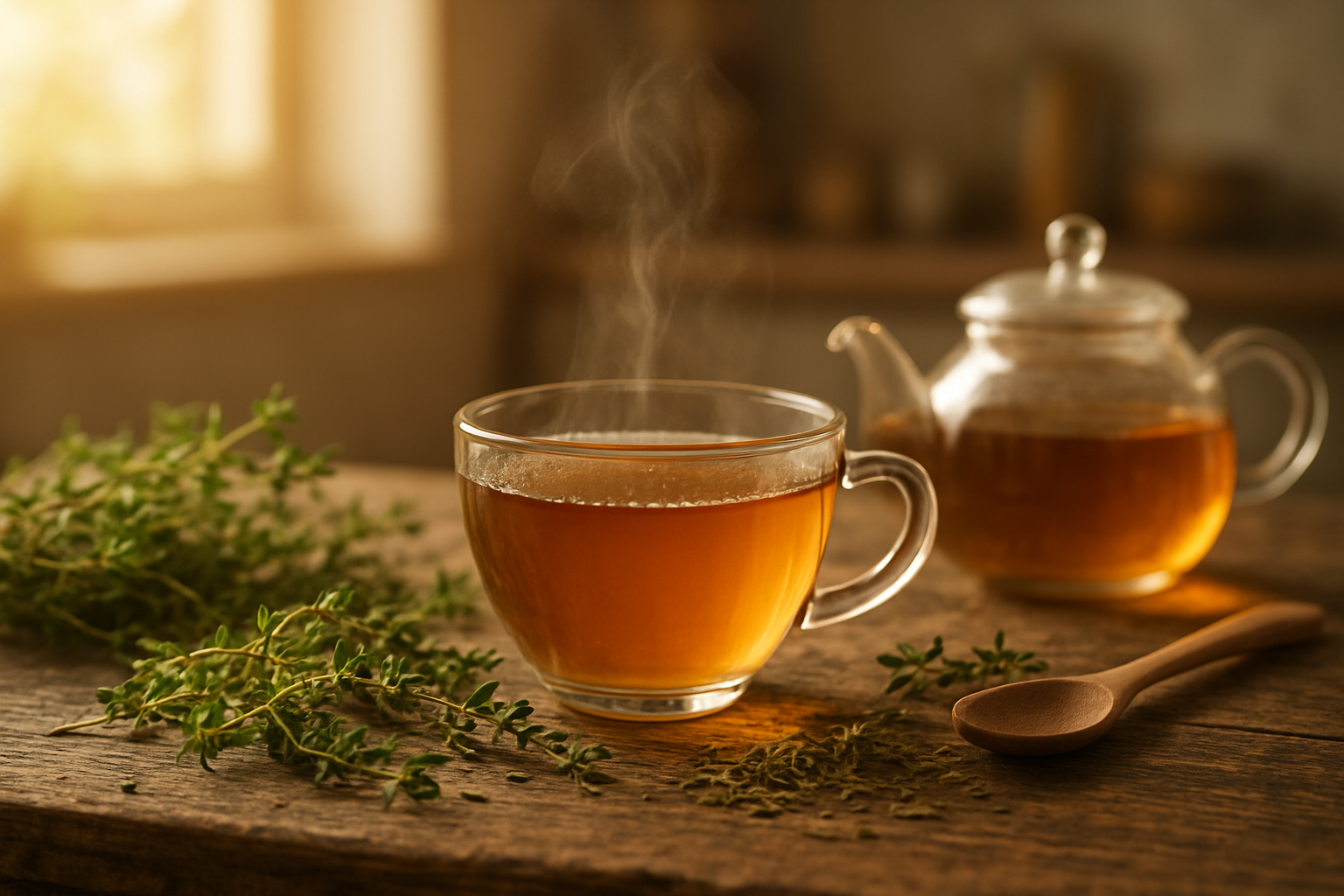
Thyme tea offers a simple yet powerful way to tap into nature’s pharmacy right from your kitchen. From supporting respiratory health and boosting your immune system to providing antioxidant protection, this humble herb packs impressive health benefits backed by scientific research. Just remember to start slowly if you’re new to thyme tea, watch for any allergic reactions, and check with your doctor if you’re taking medications or have health conditions.
Ready to give thyme tea a try? Start with the basic brewing method using fresh or dried thyme, and don’t be afraid to experiment with honey, lemon, or other herbs to find your perfect blend. Whether you enjoy it as a morning ritual, an afternoon pick-me-up, or a soothing evening drink, thyme tea can easily become a healthy addition to your daily routine. Your body will thank you for choosing this natural, flavorful way to support your wellness goals.
